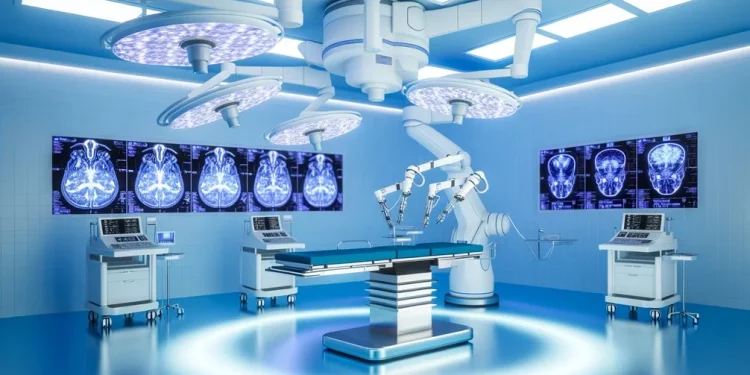AI in healthcare transforms healthcare through multiple integrated technologies. Medical imaging systems detect conditions with up to 99.6% accuracy, while AI-guided robotic surgeries reduce hospital stays by over 20%. Remote monitoring systems track patient essentials and predict outcomes using real-time data. In healthcare management, AI analyzes large datasets to optimize services and reduce errors. These innovations represent the foundation of modern healthcare’s evolution toward improved patient care.

Artificial intelligence is transforming healthcare delivery across hospitals and clinics worldwide. The integration of AI technologies in medical facilities is creating remarkable improvements in patient care and operational efficiency. As the global AI healthcare market expands toward $613.81 billion, healthcare providers are discovering new ways to leverage these technologies for better outcomes.
Medical imaging has seen significant advances through AI implementation. Ambient listening technology streamlines clinical documentation by automatically recording and processing patient-doctor interactions. AI systems can now detect heart attacks with 99.6% accuracy, working twice as fast as human practitioners. These systems enhance image quality and reduce false positives, leading to more accurate diagnoses. AI-powered radiology tools assist medical professionals in reading and interpreting images with greater precision, while simultaneously reducing costs by preventing unnecessary procedures. The AI in ultrasound imaging sector alone is expected to reach USD 2.35 billion by 2034.
AI-assisted surgeries are delivering impressive results in operating rooms. These procedures can reduce hospital stays by over 20%, potentially saving $40 billion annually. Robot-assisted surgeries, guided by AI, enable more precise and minimally invasive procedures. AI systems analyze patient data to predict surgical outcomes and provide real-time feedback during operations, helping surgeons make better decisions. Machine learning approaches are essential for evaluating and improving surgical models.
Patient monitoring has evolved with AI-powered solutions. Remote monitoring systems use artificial intelligence to track patient crucial signs and detect potential health issues early. Predictive models analyze patient data to forecast outcomes, allowing healthcare providers to implement proactive care strategies. AI-enhanced wearable devices continuously monitor health metrics, while integrated telehealth services provide real-time insights for better patient care.
Healthcare management benefits from AI through improved operational efficiency and data analysis. AI systems process large datasets to identify trends and patterns that help optimize healthcare services. These systems assist in staff allocation, workload distribution, and risk management, reducing errors and improving overall service quality.
The advancement of AI in healthcare continues with new technologies like generative AI, which is expected to reach $2.7 billion by 2025 and grow to $17 billion by 2034. AI-integrated platforms combine multiple tools for thorough healthcare management, while cloud solutions guarantee scalable and efficient data handling. Intelligent clinical coding systems optimize billing processes and reduce errors, leading to better financial outcomes for healthcare facilities.
Through these implementations, healthcare providers are discovering that AI isn’t just a technological upgrade – it’s a fundamental shift in how medical care is delivered. From improved diagnostic accuracy to enhanced surgical precision and better patient monitoring, AI continues to prove its importance in advancing healthcare quality and accessibility.


